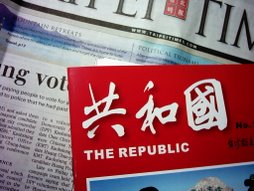--------------------------------------------------------------------------------
Published on Taipei Times
http://www.taipeitimes.com/News/editorials/archives/2007/01/15/2003344909
Welfare does not mean preferential treatment
By Taiwan Society 台灣社
Monday, Jan 15, 2007, Page 8
The nation is struggling with financial problems and solving them should be a top priority for the government.
Welfare should always be a top priority.
Legislation must be just and disadvantaged groups must be the first priority of welfare.
But the pan-blue camp in the legislature is trying to promote "financial redistribution" by proposing legislation that would allocate NT$1.5 trillion (US$45.5 billion) to the reconstruction of old army communities.
The welfare of disadvantaged veterans should of course be a concern for the legislature. Yet the question is whether the legislation the pan-blue camp is trying to push through is a real attempt to help a disadvantaged group, or whether it unfairly prioritizes one small group in society.
To this day, workers, farmers and fishermen have not received the same level of attention from welfare policies that veterans enjoy.
This cannot continue.
The legislation would be extremely harmful to all taxpayers and the blatant unfairness of the subsidies could lead to social tensions.
The Taiwan Society urges pan-blue politicians to stop following an agenda based on partisan political interests that will increase the unfairness of privileges granted to small parts of society.
Like the debate over the reform of the 18 percent preferential savings interest rate for military personnel, civil servants and government-employed teachers, the veteran welfare issue is a product of past historical circumstances.
These issues are part of the transitional justice complex and can only be given fair and rational treatment if they are considered within that context.
Some veterans are disadvantaged and some are privileged. The welfare of disadvantaged veterans should be considered and handled within the government's general welfare system for all disadvantaged groups.
In other words, the question of who is disadvantaged should be determined based on social class.
This is clearly a matter of transitional justice.
The pan-blue camp first created a problem and then tried to pass legislation to serve its own interests, while ignoring the demands posed by transitional justice.
This is unfair both to veterans and Mainlanders and shows a blatant disregard for the nation's financial situation and the welfare of the general public.
Similar incidents have shown that Taiwanese society does not care about transitional justice. Moreover, it still has to show concern even for a fundamental transition from the past.
The Taiwan Society calls on people from all sectors of society to work together to monitor both the governing and opposition camps and to work to promote transitional justice.
The pan-blue camp decision to push for this legislation also smacks of a politics of hatred.
Simply put, the opposition is using an astronomical sum as bait to raise the expectations of veterans.
The pan-blue camp knows that if these expectations are not met, the resulting disappointment will be blamed on the pan-green camp.
It knows this will foster bitterness against the pan-green government.
This would create what the pan-blue camp sees as unwavering, loyal supporters.
This kind of deceptive, selfish politicking shows a disregard for the nation's financial situation and the welfare of the general public.
The Taiwan Society calls on veterans to behave honorably and refuse to become the vehicle of an attempt to foster anger.
Stop the manipulative politicians behind legislation that would spend tax money unfairly.
Translated by Perry Svensson
Copyright © 1999-2007 The Taipei Times. All rights reserved.
Subscribe to:
Post Comments (Atom)

No comments:
Post a Comment